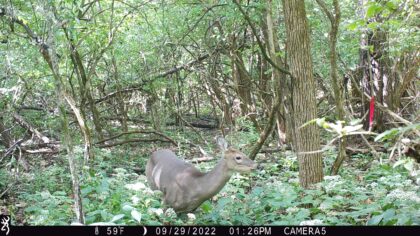Healthy Forests Require Combined Deer and Invasive Shrub Control
If left unchecked, both overabundant white-tailed deer populations and invasive shrubs like Amur honeysuckle (Lonicera maackii) can devastate deciduous native tree regeneration. Yet, a management strategy focused only on deer, or only on invasive shrubs, results in little or no forest health improvement, according to research from Ohio, spanning more than 10 years.
“Control of only invasive shrubs will reduce native cover and not improve tree regeneration,” says David Gorchov, Ph.D., and Miami University (Ohio) biology professor. “Managing only deer will increase woody plants but reduce native cover. Management of both stressors is needed to promote tree regeneration and plant community restoration.”

These conclusions summarize research, recently published online in Invasive Plant Science and Management (IPSM). For this study, Gorchov and his coauthors, M.S. student Marco Donoso and undergraduate honors student Hanna Leonard, investigated deer pressure and Amur honeysuckle effects for 11 years in a split-plot experiment in the Miami University Natural Areas in southwest Ohio, where both were at high density.
White-tailed deer and invasive shrubs that deer find palatable are commonly found in high densities in deciduous forests in the eastern and midwestern United States. As a result, these findings will help to inform forest managers throughout the region about successful practices to help forests thrive.
More information is available in the IPSM article, “Long-term interactive impacts of the invasive shrub Lonicera maackii and white-tailed deer (Odocoileus virginianus) on a deciduous forest understory.“ IPSM is the official publication of the Weed Science Society of America published by Cambridge University Press.
About Invasive Plant Science and Management
Invasive Plant Science and Management is a journal of the Weed Science Society of America, a nonprofit scientific society focused on weeds and their impact on the environment. The publication presents peer-reviewed original research related to all aspects of weed science, including the biology, ecology, physiology, management and control of weeds. To learn more, visit www.wssa.net.
Featured Image: Photo Credit: Elea Cooper.









